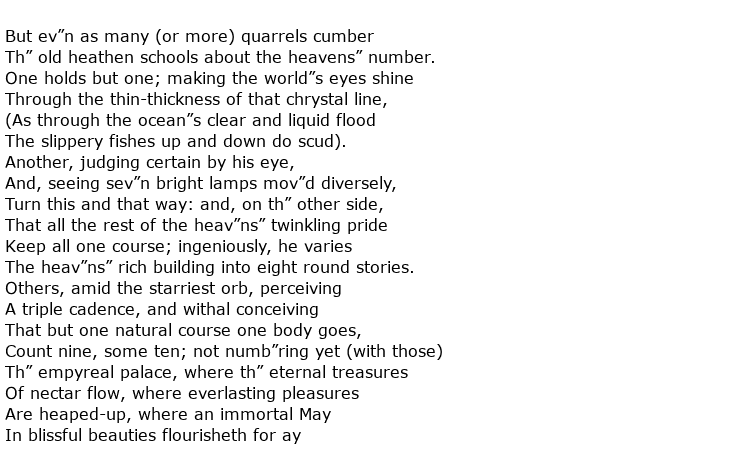 Joshua Sylvester was an English poet and essayist who was perhaps best known as the translator of a scriptural epic by the Huguenot poet and courtier Guillaume de Saluste Du Bartas. This was known as Divine Weekes and Workes.
Joshua Sylvester was an English poet and essayist who was perhaps best known as the translator of a scriptural epic by the Huguenot poet and courtier Guillaume de Saluste Du Bartas. This was known as Divine Weekes and Workes.
He was born sometime during the year 1563 in the Medway region of Kent, a county in the south east of England. He was the son of a clothier and perhaps it was his father’s early influence that would eventually guide him towards service with The Company of Merchant Adventurers of London. This was an organisation of merchants concerned with the export of cloth to many parts of the world in exchange for a variety of foreign goods. Unfortunately both parents died when he was still a young boy and he was looked after by an uncle named William Plumbe and his wife, the Honourable Mary Nevil. At the age of ten Joshua was sent away to school in Southampton and it was here that he studied hard to learn French, learning in a strict regime that forced him to become fluent in the language.
It seems likely that he would have had ambitions to succeed in the literary field but he was only able to devote time to the composition of poetry during his leisure time. He was busy making a living in the commercial world of the Merchant Adventurers, for some time employed as a land steward. His poetry did, however, come to the notice of Henry Frederick, the Prince of Wales who awarded him a pension in exchange for part time service as a poet at the Prince’s court around the year 1606. His output of poetry was not extensive but he was, nevertheless, a popular poet of his time.
It was, perhaps, an ambitious project to tackle the ornately constructed epic by Du Bartas but Sylvester seemed to find no difficulty in doing so. Like the original author, he was, himself, a disciple of the romantic poetic style of the Euphuists. The work was published in two parts: Essay of the Second Week came out in 1598 and then, in 1604, he published The Divine Weeks of the World”s Birth. They proved to be extremely popular amongst both German and English co-religionists and included a number of additions and adornments by Sylvester.
It has been suggested that John Milton was influenced by this work when he produced his own epic poem, Paradise Lost. Here is a short extract from the Divine Weeks And Works, in effect a collection of lines constructed in heroic rhyming couplets:

The popularity enjoyed by Sylvester during his lifetime did not extend too far after his death, and certainly not beyond the beginning of the Restoration in 1660. The poet John Dryden was particularly scathing about his work, calling it “abominable fustian.” Towards the end of his life he was employed on government service in the Low Countries. His final appointment, up to the time of his death, was at a town called Middelburg, the capital of the province of Zeeland.
Joshua Sylvester died on the 28th September 1618 at the age of 55.

